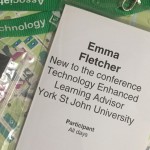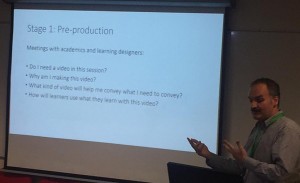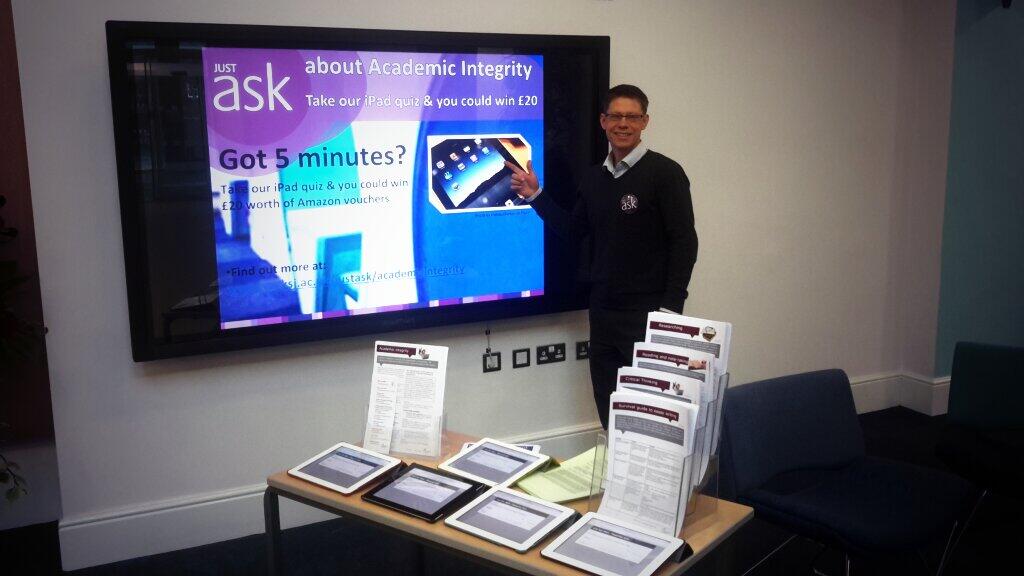ALTC 2016 – Reflections from a Conference Newbie

Last week I attended the 10th annual ALT Conference, it was a three day event held at the University of Warwick from 6-8th September, and my first conference experience. With just three weeks experience in my role it was a chance for me to find out more about what is currently happening in the HE technology and education arena as well as meet and network with my counterparts across the UK and overseas. The theme of this year’s conference was “Connect, Collaborate, Create”, with presentations broadly being split into those three strands (as well as wild card, community and keynote).
https://twitter.com/MarenDeepwell/status/772785639985209348
Day One
I set off bright and early on the Tuesday morning, arriving at the venue in time for the first keynote speech from Josie Fraser, entitled “Open Practice in the Valley of the Trolls”. She spoke about trolls in social media, a thought provoking speech on trolls, including the reasons they do it, the effects that it has had and what we can do to about it. She used the example of Tay, an AI twitter account run by Microsoft. Tay was targeted by trolls which resulted in it tweeting racist and offensive things, and leading to the account being closed down hours after it had gone live.
ALTC runs parallel sessions, so before going Phil and I had gone through the programme picking out some of these to attend. The first parallel session I attended was themed collaborate and was made up of 5 different speakers. One of my highlights from this session was a presentation entitled “Collaborative technologies, higher order thinking and self-sufficient learning: a case study of adult learners [1253]” from Clare Johnson. She worked with adult learners at college level I could see through the use of technology higher order thinking was evident. The students were having discussions online and helping to solve problems for each other. She developed the arrow model for working toward higher order critical thinking in online learning.
@ClareOnTheRun 's Arrow model – working toward Higher Order Critical Thinking in online learning pic.twitter.com/OWPRIWJ2AD
— Jane Mooney (@Jane_Mooney) September 6, 2016
After the buffet lunch I attended two create themed sessions and the final item of day one was a keynote speech from Lia Commisar, from the Wellcome Trust, who I had spoken to at lunch and bonded over being a fellow ex-teacher (biology had been her specialism), who spoke about educational neuroscience. She debunked some common education and learning myths, such as the VAK learning styles and left brain / right brain and 10% use of the brain, to much murmuring from the audience. She also spoke about the six research projects that the Wellcome Trust is funding into neuroscience and learning.
Day Two
The second day started with the keynote speaker Ian Livingstone, with “Code Create Collaborate”. Having previously worked in secondary education for 13 years I struggled with this talk. I didn’t recognise a lot of what he said was currently happening in education (certainly not in my experience) Furthermore his ideas for “authentic education” are already in place in schools, and have been for quite some time. I also found his opinions on the subject I taught (ICT, latterly computing) quite negative and untrue. Many of the changes that have taken place in the subject recently (due in part to him according to this presentation) certainly didn’t have the fully positive impact (the take up of the subject had decreased if anything). He is planning on opening two free schools.
Following the keynote I attended two create sessions before lunch, seeing 5 different presentations. My highlight from these was “Pedagogic Video Design: A Framework for Producing Instructional Videos [1344]” presented by Fotios Begklis from Imperial College. He went through, in detail, the three stages of video production, emphasising the importance of the pre-production stage and the need to work closely with academics at this point. His other tips included the best length of a video (4-6minutes), film parts separately (so sections cane be later replaced with up to date content), script everything beforehand & pre-review it, the academic should ask questions (to wake the student viewer up! To ensure they’re not just passive) and post production is the most time consuming part. 
The day ended with a drink reception, ALT Learning Technologist of the Year awards and the gala dinner.
Origami for #altc with #play table 27 @A_L_T pic.twitter.com/tamUCp2f0E
— Andrew Smith 🦻 (@teraknor) September 7, 2016
Day Three
The final day seemed to start a little more subdued, the breakfast hall certainly seemed quieter, I can’t think why.
The day’s programme started with a keynote from Jane Secker entitled “Copyright and e-learning: Understanding our Privileges and Freedoms”. In it she spoke about the difficulty with copyright in the digital age. She discussed whether we should view our intellectual property in the same we view our physical property. She went on to talk about the invention of the Creative Commons the legal solution through licensing to make sharing content more open. Issues around copyright seem to get much more complicated when you’re teaching online, whilst people do use references and citations it’s easy to share content.
The two parallel sessions I attended during Thursday were themed collaborate and create. One of the presentations in these sessions I found interesting was “Innovating from the outside in: a creative hub to change eLearning practice [1380]” presented by Sonja Grussendorf from LSE. Her talk was about why aesthetics matter in online courses as much as instructional design. She explained about the design project she’d worked on, to develop a creative hub for academics to draw on for their teaching. It focused on Moodle and it’s use as a learning space (rather than an administrative tool or glorified drop box). She went on to explain why good design of online learning spaces matters.
https://twitter.com/authenticdasein/status/774131149635321856
The closing keynote of the conference “Being Human is your Problem” came from Donna Lanclos and David White. One theme from this talk was that technology is not the solution (nor is it the future, it’s here already), people are the solution.
What to find out more?
Some of the presentations are available to watch on the ALT Conference website and YouT ube channel, including all of the keynote speeches. Over on Twitter the ‘ALTC’ hashtag is a lively and informative feed – giving personal highlights and takes on what was said over the three days from many attendees, well worth having a look at. There’s even an ALT-C playlist available on YouTube.
ube channel, including all of the keynote speeches. Over on Twitter the ‘ALTC’ hashtag is a lively and informative feed – giving personal highlights and takes on what was said over the three days from many attendees, well worth having a look at. There’s even an ALT-C playlist available on YouTube.
Emma


